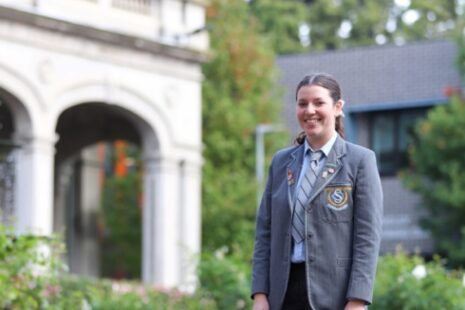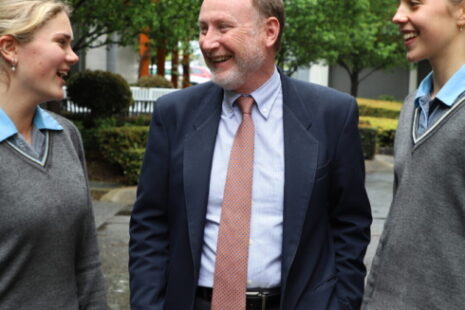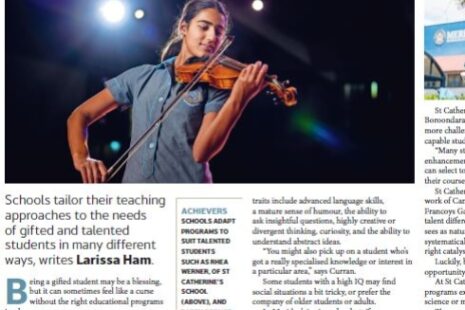Building the Dispositions of the Language Learner
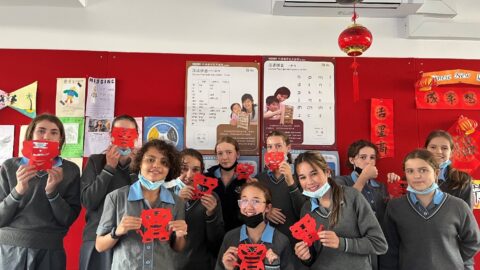
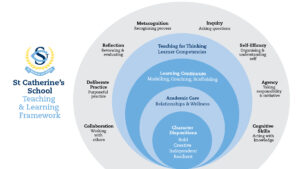 In 2022 our teachers of Languages are embarking on a professional learning journey to build the learning dispositions of the language learner in each St Catherine’s student. At each Year level, in each Language, and in each lesson, we seek to develop students’ agency through metacognitive practices and to embed their linguistic knowledge through deliberate practice.
In 2022 our teachers of Languages are embarking on a professional learning journey to build the learning dispositions of the language learner in each St Catherine’s student. At each Year level, in each Language, and in each lesson, we seek to develop students’ agency through metacognitive practices and to embed their linguistic knowledge through deliberate practice.
For second language learners these dispositions are reflected in the Australian Curriculum for Languages, which articulates the goals for all Australian students through the Strands of Communicating and Understanding.
Menzies Foundation Emerging Leaders Fellowship recipient, Lan-Tian Yen-West studies both Chinese and French. Having already visited Hangzhou in 2019, she spent the 2021 holidays at our Sister School, the Cours Fénélon in Toulon.
“You realise how cool communication is. I was sitting beside a Brazilian man on the plane who travels the world with his pharmaceutical company. He was fluent in seven languages. We started conversing in English and swapped into French when he told me he speaks French. We talked the rest of the way in French.” Lan-Tian Yen-West
Students’ capacities for success in a second (or third) language requires deep engagement, not only with the language as a system, but how that language is reflected in its cultural norms and practices. Our curriculum constantly creates these links between Language and Culture. Classroom activities support students’ growing understanding of the dynamic nature of language, which changes according to region, context and purpose. I can commend to you the current NGV Exhibition on the legacy of couturière Gabrielle “Coco” Chanel to develop students’ intercultural understanding.
St Catherine’s provides a range of resources to enable students to build their linguistic and cultural knowledge. Ask your daughter whether she regularly practises her skills using her Language Perfect subscription, YABLA, News in Slow French or Blooket? Mastery in a second language requires deliberate practice of reading, writing, listening and speaking skills. Our high achieving alumnae of 2021 exhibited the dispositions of agency and deliberate practice in different ways:
“For me, I found consistency to be my best friend throughout VCE French. Every night in the latter half of the year, I would speak for 20 or so minutes in French with a friend from class. No exceptions, as tempting as it is to procrastinate. On my way to School most mornings, I would listen to a French podcast, in lieu of French music, as I tended to focus more on the words and conversation than musical rhythm. Finally, if I learned a new word, I would make an effort to use it twice more naturally that week, so I used new terminology in an array of circumstances.” Ruby Moir, Class of 2021
Acquiring a second language involves making connections, both linguistic and cultural between the Australian context and the second language. 2021 alumnue Tingquan (Gloria) Meng (’21) achieved outstanding results in Japanese. She identified metacognitive practices which supported her second language acquisition. She recommends that students:
“Understand your own language before learning a new language, so that you can find the similarities and differences between languages, which can help you understand more about new languages, for example, how are the sentences structured? How do you change tense? Is there a similar concept in another language?”
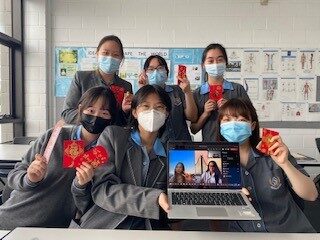
In Year 11 Chinese, students are developing their intercultural understanding through paper cutting for the Spring Festival
In Year 11 French this week, students were able to read about Putin’s policies in the Ukraine on the website 1Jour 1Actu. Students then compared perspectives between Australia and Europe and how current events reflect differing historical, cultural and political perspectives.
Our Senior Years Independent Learning Tutorials support students’ agency and give them a structure to direct their own learning. After her return from France, Lan-Tian reflected on the way agency is important for her VCE studies:
“My exchange experience has made me more able to manage the stresses of Year 12 because I’ve been operating independently in France. I travelled independently between countries, so balancing my studies seems really manageable. I haven’t been stressed so far this year. I’m not relying on others. I’m taking more control of things because I’ve learned to do so. There is nothing VCE can throw at me that I won’t be able to manage.”
Clearly one of the most powerful learning experiences is an immersion exchange. There is strong pent up demand, with over 20 St Catherine’s students having registered their interest. We hope to support all these students of Languages build their linguistic and cultural understanding. Lan-Tian explained how her own exchange has enhanced her language learning.
“I started the year snowboarding in the Alps. At the airport, in Paris I was asking people for help in French and negotiating everyday transactions. Basically, I have been totally immersed and I have returned immersed. It’s now natural to watch a TV program or read a book in French. It’s natural and I don’t have to think about it. This is obviously the ideal way to embark on Year 12.”
The above reflections on learning from current and past students highlight the School’s commitment to developing St Catherine’s students who are Bold, Resilient, Creative and Independent.


